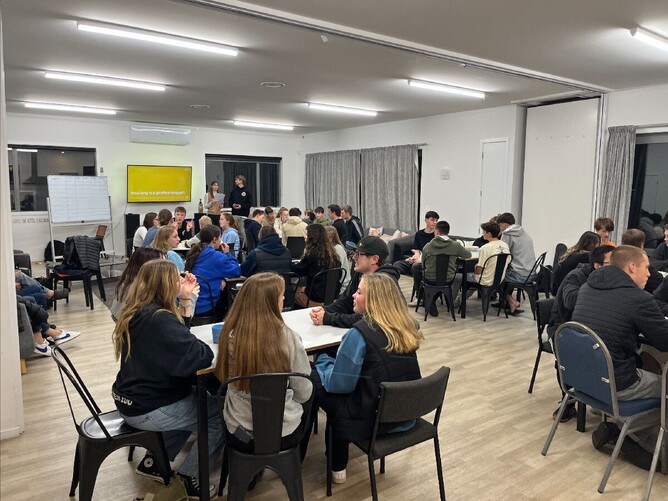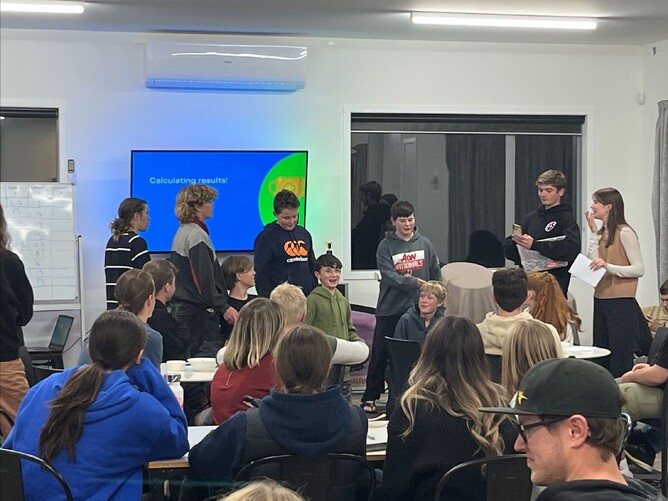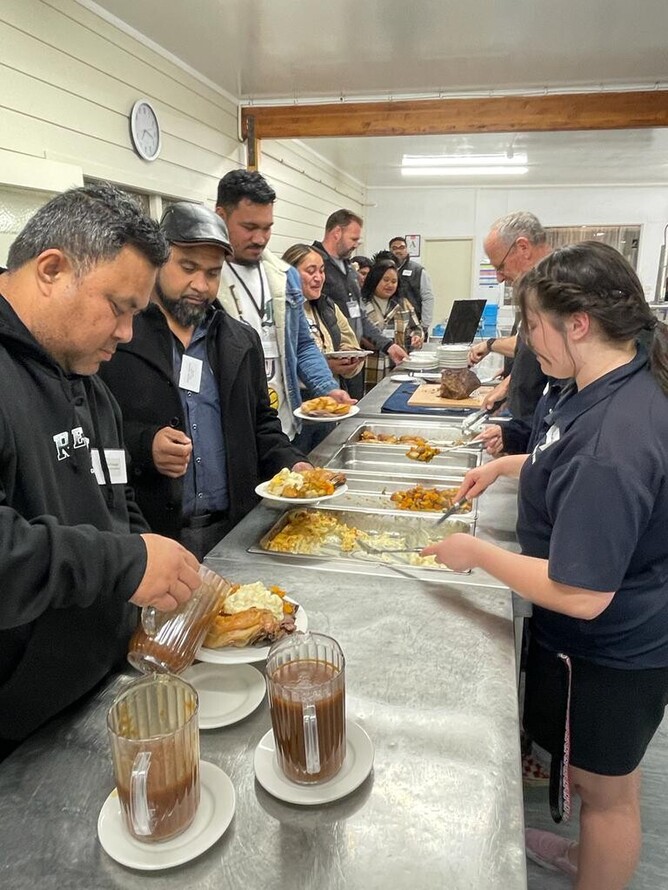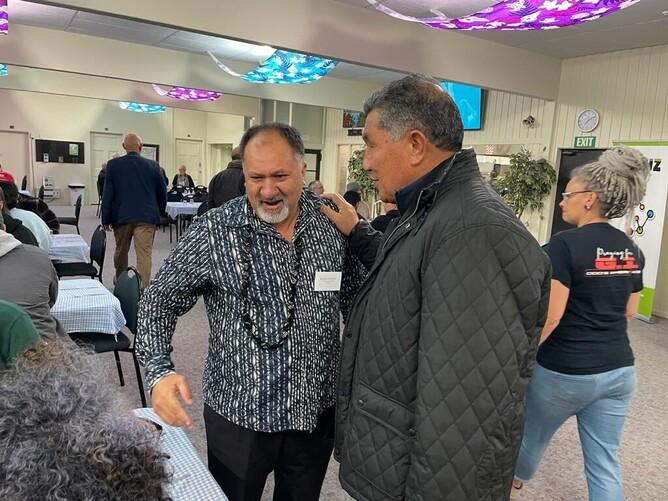Matthew 26:42
"Ona toe maliu ‘ese lea o Iesu, o lona fa‘alua lea, ma tatalo atu, “Lo‘u Tamā e, ‘āfai e mafai ‘ona ‘ave‘esea lenei ipu se‘i ‘ou inu ai, ‘ia faia lou finagalo."
"He went away a second time and prayed, “My Father, if it is not possible for this cup to be taken away unless I drink it, may your will be done.”
"Ka haere atu ano ia, ko te rua o ona hokinga, ka inoi, ka mea, E toku Matua, ki te kore e ahei kia pahemo atu tenei kapu i ahau, a me inu ano e ahau, waiho i tau i pai ai."
In this chapter of Matthew, Jesus faces the furnace.
He stays up through the night, watching for the dawn to break, taking in every moment of the last night before he would die.
Judas had agreed to betray Jesus to the authorities. Jesus had eaten with his disciples for one last time. Peter, one of his most loyal followers, had been told he would disown Jesus.
As the sky turned from midnight to morning, Jesus takes the disciples to an olive grove on a hill that overlooks the city walls of Jerusalem. Time slows. Jesus grows somber and troubled.
Looking on, we feel the furnace before we see it.
We feel it in the increasing sorrow of Jesus in verse 38. He is grieved by sorrow, sorrow swelling into crippling anguish.
Looking on, we see the furnace's effect before we understand it. Jesus collapses under the weight of grief in verse 39.
He prays in desperation: “Take this cup from me."
Jesus' prayer shows us that the furnace is not the betrayal by friends. It is not denial by those closest to him. The furnace is that which is about to happen to him in eight hours. The furnace, "the cup", for Jesus is the cross.
And it is not simply the fact that Jesus is going to die; throughout history, thousands of people have faced death calmly for their convictions. The furnace, “the cup”, is not even the torturous manner in which he is going to die.
For Jesus, the furnace is summed up in his painful cry on the cross: “My God, my God, why have you forsaken me?”
For Jesus, the furnace is separation from God's good grace. God no longer looked on his Son with love, because he bore the sins of others. Jesus was forsaken, so that no child of God would ever be God forsaken.
On the cross, Jesus became a cosmic sponge—absorbing the evil of humanity and bearing the full wrath of God against it. He lovingly absorbs God's good anger. On the cross Jesus drank the dregs of God’s good and holy judgment, so that not a drop remains for his followers.
As he faces the furnace, Jesus prays to God, calling him “my father”. Even in the crippling agony of what is to come, Jesus tenderly addresses God as Father.
"My Father."
I am challenged by this, and comforted.
My natural thought is to think that the more pain I am in, the less present God is. The harder something is, the less likely God is involved.
The truth is, that's not how Jesus thought. More often than not, the reverse is true. And the harder something is, the more we run to God for refuge.
Staring into the fiery furnace, Jesus addresses God as father. God was present with him in the dark hours.
In hindsight, our hardest moments are often the holiest, because we realise our Father is near.
By Mark Grace, CCCNZ Ambassador
Churches Come Together for the Gospel
Our heart is to see churches—and the regional campsites and national ministries that serve them—working together to point people to Jesus through the gospel from the Scriptures.
It’s one of the simplest and most significant things we can do as churches. If we are running preaching training, youth leader or children and family leader training, opening it up to one or two more churches in the movement could be a tremendous blessing.
Sarah Chalmers, youth pastor at Hillcrest Chapel in Hamilton writes:
“Last weekend Chapel Hill Community Church, Northgate Community Church and Hillcrest Chapel came together for a youth quiz night.
"This is the first of a few combined events we have planned, with each church taking a turn to host. One leader commented: 'Our hope is that our kids will develop relationships with more kids their age so that when they move on to university or venture out into the world there is better chance of connection.’
Dear Lord, we ask for your good hand to be on this initiative and others as your people at Chapel Hill, Northgate and Hillcrest work together.”
Māori and Pasifika Leaders Dinner
Closest to the camera, Satalaka Ligovasa and Meauke Finauga from Tuvalu Brethren Assembly find a "beautifully cooked meal.”
I deeply appreciated being with Māori and Pasifika leaders from across Auckland and across the country last Friday night for the second annual Hui at Willow Park Christian Camp in Auckland.
The evening was spent eating, laughing (thank you, Max) singing, and exploring together how we can be working together to point more people to Jesus through the gospel from the Bible.
My impression from the evening is that it was profoundly significant, for both the Pacifika CCCNZ/OBH Community and Maori CCCNZ/OBH community in Auckland and across the country. It had the sense of new beginnings, of a spark being lit. It felt like a baton was being passed from one generation to another. I left the gathering profoundly grateful for the opportunity to be there.
The other impression I had from the evening was that we are in good hands. The quality of our younger Māori and Pasifika leaders is a real delight to see!
I am grateful for the leadership of Max Guptill and Jerome Edwards. Jerome and Max desire to summarise the input given at the hui, send word back out to participants and to call another Hui to begin putting legs on it. I can’t wait to see what God will do through this gathering.
Above left, Jerome Edwards (Tamaki Community Church and Willow Park staff member) who co-hosted the hui talking with Robert Siakimotu (Onehunga Bible Chapel) before dinner.










